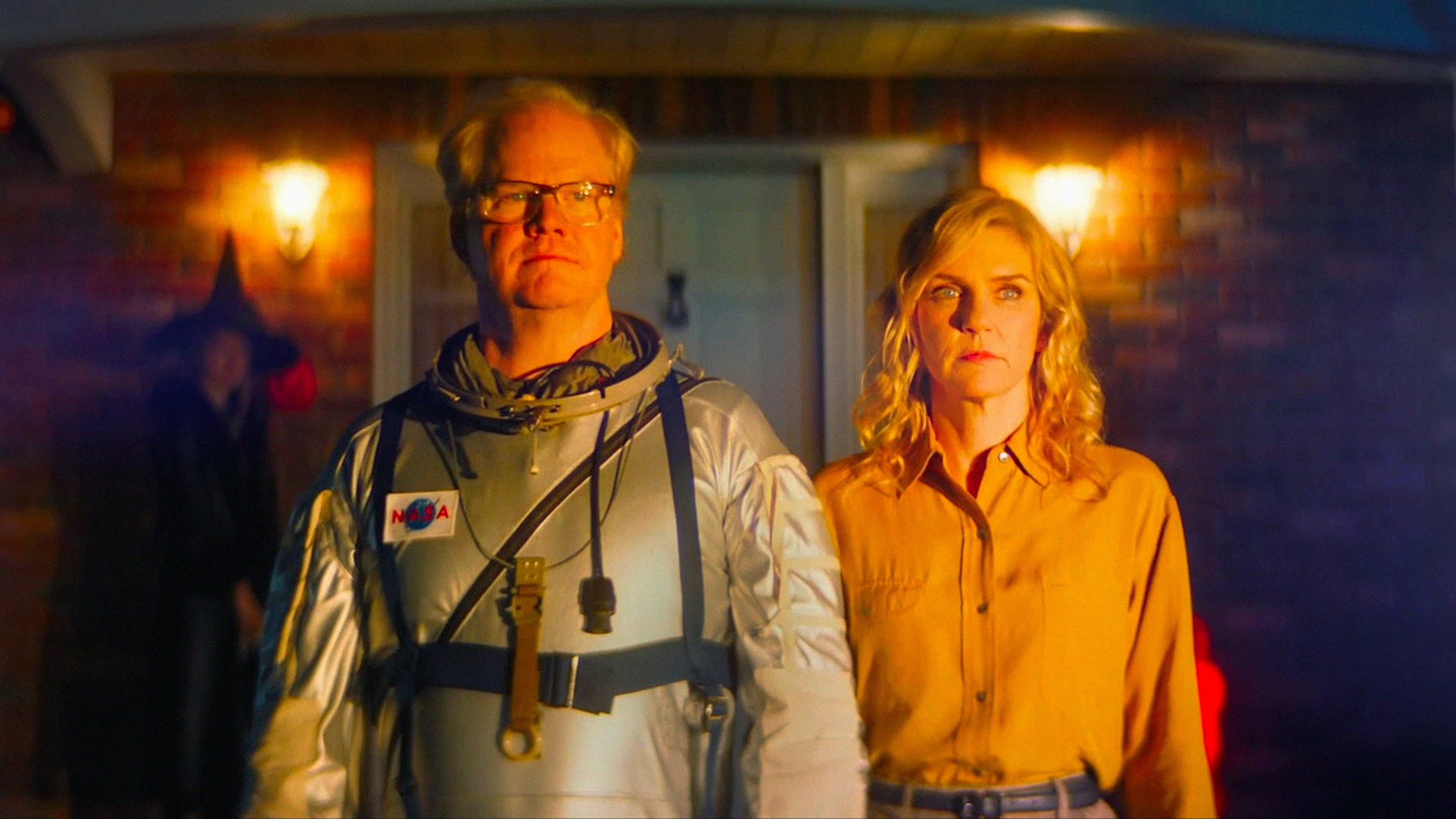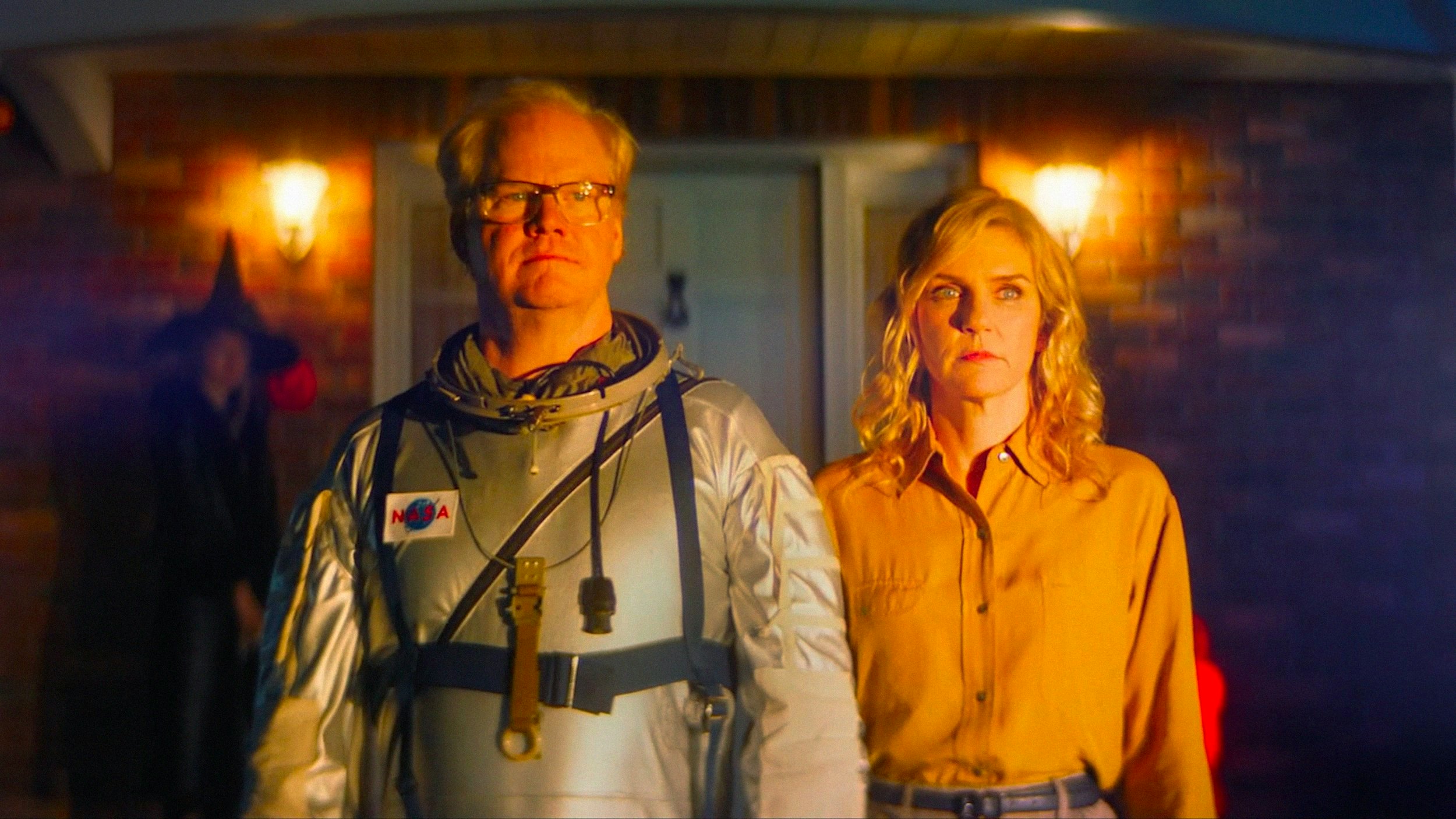
A midlife crisis isn’t inevitable. In fact, they’re rarer than you’d think. But people who do hit that brick wall as they creep toward 50 hit it hard: Their spark fizzles, their emotions tank, they begin thinking about their demise the way the rest of us think about travel planning, and they drop their old hobbies for new ones. It isn’t pretty.
Think about the male midlife crisis car. It’s a stereotype, but stereotypes come from somewhere. You wake up one morning, realize you’ve left your youth in the rearview, and you buy a Corvette. Cameron (Jim Gaffigan), the lead in Colin West’s new movie Linoleum, builds a rocket in his garage to satisfy his childhood ambition of becoming an astronaut. This makes the Corvette seem preferable. Mad as Cameron’s design might be, it at least it comes from an honest place, but this is small consolation for his family.
Linoleum is an odd production, not for better or worse but holistically; it’s gentle, warm, and well-made with a deliberate style, as if West sees Cameron’s struggle and empathizes with him via his own craftsmanship. Ed Wu, West’s cinematographer, unhurriedly moves his camera from point to point in every scene, coolly panning between actors and objects, following alongside Cameron as he casually bikes through his suburban neighborhood. Every once in a while Wu lets the camera roam free like a dog let off their leash, but the film is mostly shot with a careful hand. The attention to aesthetic matters. West and Wu strive for a style that’s both bold and empathetic, and empathy is what these characters desperately need.

Cameron’s failures as a NASA aspirant are compounded by his failures as the host of a children’s science program. His wife, Erin (Rhea Seehorn), has divorce papers on the way, a signal of her own midlife crisis. Erin, for her part, is trapped in the armed hostilities moms so often have with their daughters. Nora (Katelyn Nacon) is on a first name basis with Cameron, because “dad” just doesn’t cut it, and shows Erin no quarter when they squabble. Being the default high school outsider isn’t fun, but the arrival of another outsider, Marc (Gabriel Rush), eases Nora’s burden. Marc, of course, has his own burden as the son of Kent Armstrong (also Gaffigan), a hero astronaut who bears a too-striking resemblance to Cameron.
This is an odd coincidence, but Linoleum builds its plot on so many odd coincidences that they stop feeling odd after about 20 minutes: Kent falls out of the sky in his car (a Corvette, of course) and crash lands next to Cameron’s mailbox, then moves into the house across the street with his Corvette intact and zero recollection of having plummeted to the Earth, and then a satellite rocket crash lands in Cameron’s backyard.
Things fall. It happens. But it doesn’t usually happen this often, and Linoleum uses the absurdist surreality of these events to grease the wheels of West’s narrative. Rather than mope — about Erin, about NASA, about his spurned life — Cameron gets to work. Moping only fills in the margins of his mad attempt at salvaging the rocket, which is more than can be said about most men in his position.

The pairing of subject and material makes a refreshing take on white male midlife crisis stories, with the added bonus of excellent performances from Gaffigan and Seehorn. It’s not unusual for comedians to stow their stage personas and play to their serious sides in the movies, à la Adam Sandler, Melissa McCarthy, Sarah Silverman, and Steve Carell. In Linoleum, Gaffigan takes a similar tack, though he mines so much rich humor from the doldrums of everyday life in his standup that the pivot isn’t quite as startling.
But that’s not to say he isn’t good, because he is, particularly as Kent, representing a darker side of paternity as an uptight disciplinarian careerman. We gravitate toward Cameron because he hews closer to the Gaffigan we know, but we react more strongly to Kent as Gaffigan’s shadow. By comparison, Seehorn has “less” to do than Gaffigan, but only in a straightforward logistical sense. Erin is complex, and the complexities of her temperament, and thus Seehorn’s work, become clearer as Linoleum progresses and its mysteries grow in prominence.
It’s in these mysteries where Linoleum runs into what amounts to trouble for an otherwise considered piece of filmmaking. Linoleum reads like Donnie Darko’s sunnier cousin; Richard Kelly is a killjoy and West is a hugger. Over time, the film starts taking notes from movies like Shutter Island too, not in its atmosphere but in its revelations. Even then West keeps things chipper and bright, as if he ran every frame through a twee machine before wrapping post-production. The optimism that’s central to Linoleum’s character helps disguise the incongruity of its two halves, one concerned with Cameron, the other with Erin and Nora; when both sides are joined at the end, they don’t quite fit.
Cameron’s story is about 50-something regret. Erin’s story follows suit to start with, but ultimately boils down to how she relates to Cameron. Her story folds into his, which isn’t the promise Linoleum lays out for us. Grant that the movie goes in an unexpected direction and takes us to unexpected places, and this, paired with breezy construction and Gaffigan and Seehorn’s performances, makes the mismatch between emotional setups and payoffs go down a little easier. Still, it’s uniquely disappointing seeing a movie with Linoleum’s potential make such a fundamental stumble right before it ends.
Linoleum debuted at South by Southwest on March 12, 2022.







